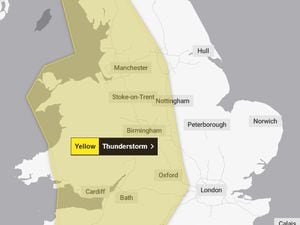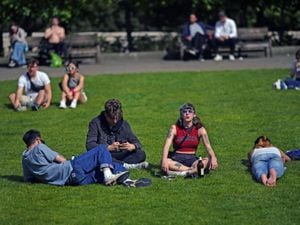Optimism as Shropshire wild swimmers go for bathing water status despite river pollution concerns
A wild swimmer is optimistic some of Shropshire's waters could soon be in line to receive bathing water status - despite concerns over raw sewage being dumped in the River Severn.

Swimmers in Shropshire are applying for bathing water status for the river in Shrewsbury and the River Teme in Ludlow. It comes as wild swimming spots in Rutland, Devon and Suffolk will be granted the status from next month.
This means they will soon benefit from regular water-quality monitoring, improving river health for wildlife, swimmers and everyone else using it.
Alison Biddulph, a wild swimmer who is campaigning for the status in some of Shropshire's waters, is hopeful that water in the county could be next.
"I think there is a good chance of us getting it," she said.
"Shrewsbury Town Council have been really supportive and Councillor Kate Halliday is trying to get a working group set up. Hopefully the first meeting will be soon.
"I haven't had a response from [Shrewsbury MP] Daniel Kawczynski , but I am meeting [Ludlow MP] Philip Dunne about the River Teme.
"The anglers have been very helpful and they do a lot of testing of water quality. They really want the river clearing up to help the fish.
"I feel really positive about it. It seems like everybody feels there is a need for this and for raising awareness."
Alison, who also featured on Channel 4's Gogglebox recently, with TV armchair critics concerned that swimming in the Severn in Shrewsbury was like "putting your head in a toilet bowl".
Severn Trent Water has come in for criticism over raw sewage being pumped into the river. But Alison said the firm "is keen to try and improve the situation", and that they have been supportive of the bathing water status application.
She added: "It would be great if we can get it. It would help it be a better environment for the fish and wildlife as well as swimmers."
The latest update nationally takes the total number of official bathing waters across the country to 424, the highest recorded.
The Government said the proportion of bathing waters assessed as 'good' or 'excellent' has increased from 76 per cent to 93 per cent, while 72 per cent are considered 'excellent' compared with 51 per cent in 2010.
This is despite classification standards for bathing waters being made stricter in 2015, it claims.
The announcement follows the publication last week of the Government's Plan For Water, which said water companies could face unlimited fines for dumping raw sewage in rivers, and outlined proposals which could see wet wipes containing plastic banned.
Labour said the plan amounted to a rehash of old policies and claimed the measures would not stop sewage being dumped.
Water minister Rebecca Pow said: "These popular swimming spots will now undergo regular monitoring, starting this May, so bathers have up-to-date information on the quality of the water.
"The regular monitoring also means that action can be taken if minimum standards aren't being met.
"We now have more bathing waters than ever, and we've worked hard in recent years to boost their status - with an incredible 93 per cent now classed as good or excellent - and our new Plan For Water will help us go further and faster on our targets."
The Environment Agency will take regular samples at the newly designated sites during the bathing season - which runs between May 15 and September 30.
It will assess whether action is needed to cut pollution levels and work with local communities, farmers and water companies to improve water quality at the sites.
The Department for Environment, Food and Rural Affairs says when it selects new swimming sites, it considers how many people bathe there, if the site has suitable infrastructure and facilities, such as toilets, and where investment in water quality improvements following designation would have the most impact.
Only those applications that meet these factors are taken forward to public consultation.





